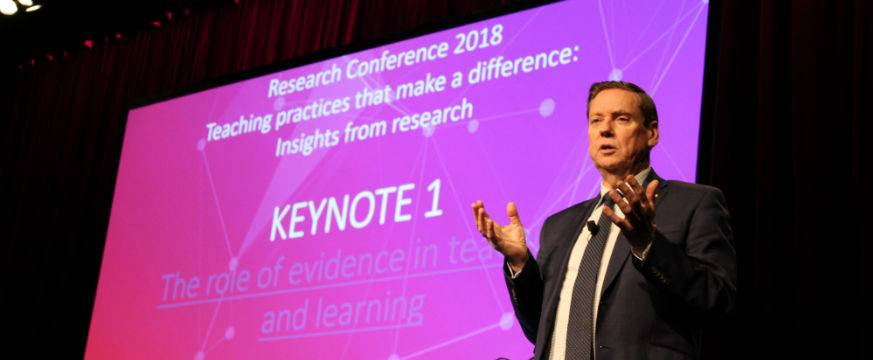
Research Conference 2018 closes in Sydney
Research 17 Aug 2018 5 minute readACER’s Research Conference 2018 took place in Sydney in August, with leaders in education from around the globe coming together to explore the theme ‘Teaching practices that make a difference: Insights from research’.
Research Conference 2018 closes in Sydney
There are many opinions about the most effective ways of teaching, Australian Council for Educational Research (ACER) Chief Executive Professor Geoff Masters AO said in his keynote address, and the challenge lies in determining which methods have solid foundations in research and successfully improve student outcomes.
It was a topic that carried over into Professor Masters’ onstage conversation on evidence-based teaching with The University of Melbourne’s Laureate Professor John Hattie, moderated by the Centre for Strategic Education’s Anthony Mackay AM. Professor Masters drew on international experience to illustrate the role systems play in creating the conditions in which teachers are able to be most effective, positing the idea that we might need to think differently about how we organise learning. Professor Hattie, meanwhile, rejected the idea that we should look at how things are done overseas and concentrate instead on what evidence produced by the Australian experience is telling us. Learning progressions – the ability to measure a student’s progress, rather than achievement of age-related benchmarks, in an area of learning over a period of time – were explored, particularly in relation to the ongoing debate about definitions.
‘People currently interpret progressions differently,’ Professor Masters said. ‘Some people say learning progressions might be good in some areas of the curriculum, or that they sit alongside the curriculum in some way, that they’re not the curriculum (which they aren’t) or maybe that they can be used as an assessment tool for data gathering.
‘The way that I think about a learning progression is, it’s simply our attempt to be more explicit and to clarify what we understand by progress or improvement, or growth, within an area of learning – and that understanding should underpin any curriculum.’
Other program highlights
Professor Hattie also delivered the prestigious Karmel Oration to the audience of practitioners, policymakers and academics, exploring the ‘amateurisation’ of education in a world deluged by ‘fake news’. The oration was a clarion call for recognition of the immense value of educator expertise, and put the case for greater critical enquiry, evidence to justify inputs and proper resourcing of educators to best maximise their impact.
In his oration, he suggested three notions of progressions:
- Big P progressions: the kind of document outlining ‘scope and sequence’ that is favoured by curriculum committees
- Middle P progressions: a picture of typical progress in a learning area, informed by evidence
- Little P progressions: modelling progression for each individual student.
Secretary of the NSW Department of Education Mark Scott AO opened the two-day conference at Sydney’s International Convention Centre on Sunday 12 August, launching a program that featured international speakers Professor Doctor Eckhard Klieme from Germany’s Goethe University on the three dimensions of teaching quality and New Zealand’s Dr Alison Davis of Vision Education on motivationally anchored instruction.
Research insights into teaching practices
Academics and researchers from Australia included:
- The University of Western Australia’s Emeritus Professor Bill Louden discussing the Kimberley Schools Project
- From the University of Sydney: Professor Robyn Ewing on arts-rich pedagogy and Professor Peter Reimann discussing online group work
- From the Australian Catholic University: Professor Romina Jamieson-Proctor on three decades of research into the impact of ICT on learning and Professor Claire Wyatt-Smith on collaborative professionalism
- The University of Technology Sydney’s Professor Lori Lockyer on design practice
- The University of Newcastle’s Laureate Professor Jennifer Gore on quality teaching rounds
- Ian McCarthy from the Centre for Education Statistics and Evaluation on a longitudinal study of the impact of teaching practices in NSW high schools.
And from ACER:
- Dr Hilary Hollingsworth and Research Fellow Jonathan Heard on the future of school reporting
- Dr Lawrence Ingvarson on ACER’s Portfolio Project to assist teachers required to provide a portfolio to apply for lead teacher or highly accomplished certification
- Dr Dan Cloney on the power of the early childhood education and care system to close the disadvantage gaps attributed to inequity
- Dr Claire Scoular on an assessment framework to help monitor and assess teaching and learning of 21st century skills in the classroom
- Research Fellow Danielle Anzai on early literacy skills.
Research Conference 2018 also included the graduation ceremony for ACER’s Graduate Certificate of Education – Assessment of Student Learning, as well as a celebration of the newest title from ACER Press, ‘I'm the Principal’: Principal learning, action, influence and identity by Stephen Dinham, Kerry Elliott, Louisa Rennie and Helen Stokes.
As the conference closed on Monday 13 August, Professor Masters said schools are presented with a bewildering choice of strategies, programs and approaches.
‘It’s a real challenge for schools and teachers to evaluate these programs and methods, and whether they have solid foundations in research,’ Professor Masters said. ‘We hope Research Conference 2018 has provided practitioners, policy makers and academics with a greater understanding of teaching practices that make a difference, and how to recognise them.’
Further information:
Read the Conference Proceedings.
A podcast of the 'in conversation' session between Geoff Masters and John Hattie is available at Teacher.